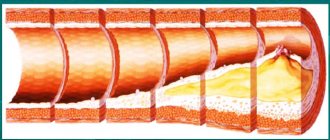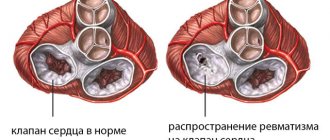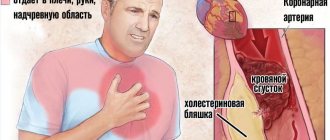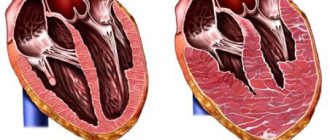Risk factors
It is known that cardioneurysm is one of the types of neurosis. To treat the disease, you should seek help from a neurologist; a psychotherapist will help in this situation.
According to statistical studies, approximately 1/3 of patients with cardiac neurosis turn to medical professionals, complaining of pain in the heart, arrhythmia, and shortness of breath.
Other causes of cardiac neurosis include a number of traumatic factors. A weakened state of the nervous system is referred to as cardiac neurosis. Most often, a patient with cardiac neurosis suffers from pressure surges due to several reasons simultaneously.
It is worth noting that the main cause of cardiac neurosis is a disruption of normal regulation in the human nervous system. In particular, the regulation of vegetative centers is significantly disrupted.
Experts include the following main signs of cardiac neurosis:
- chronic diseases in the area of internal organs;
- stressful situations, frequent emotional breakdowns on a regular basis are a sign of heart neurosis;
- the presence of bad habits is an additional burden on the heart, for example, excessive consumption of alcoholic beverages, smoking affects the development of the disease;
- A person’s lifestyle plays a significant role. The main risk factors for cardiac neurosis in this case include sleep deficiency, unbalanced diet, complete or insufficient physical activity;
- if the endocrine system does not function properly, negative changes in a person’s health are observed, being a sign of heart neurosis;
- if the patient had problems with brain function, the situation only gets worse;
- Common causes of cardiac neurosis include diseases that depend on the functioning of nerves in the body.
First aid for an attack
Acute episodes of cardioneurosis must be stopped as quickly as possible. The room where the patient is located is ventilated. They measure his pulse, if possible his blood pressure, and calm him down. If the attack occurred during a conflict, the quarrel should be stopped immediately.
In the presence of severe psychotraumatic factors, for example, an accident, they try to take the patient into a calm environment, give sedatives (Persen, valerian tincture), and distract him from thoughts of danger. The sufferer himself can use breathing exercises.
Deterioration of the condition, prolonged pain are indications for calling an ambulance.
Characteristic symptoms of cardiac neurosis
During the diagnosis of cardioneurosis, the patient observes a number of symptoms characteristic of the disease. Among the main manifestations of cardiac neurosis are cardialgia during neuroses and frequent panic attacks. Such signs are attributed both to a separate pathological change and constitute symptomatic manifestations of cardiac neurosis.
General symptoms can be noted when diagnosing cardiac neurosis:
- With a rapid heartbeat, tachycardia occurs. It can be either a symptom or an individual manifestation of another pathological change.
- With cardiac neurosis, patients most often suffer from chest pain in the heart area.
- A disturbance in the rhythm of the heart muscle is called arrhythmia. A person complains of “cardiac arrest.”
- A symptom of cardiac neurosis is also a feeling of chills; the patient suffers from constant bouts of fever. Such changes in temperature are a symptom of heart neurosis. At this moment, a person feels a rush of blood and heat. The situation may be exactly the opposite, when the patient cannot warm up, he is shivering, and there are complaints of severe cold.
- With rapid breathing, lack of air, inability to breathe normally, the patient suffers from shortness of breath. This condition often causes panic; this phenomenon accompanies cardiac neurosis.
- Arterial hypertension should also be noted. After all, it is precisely the increased blood pressure that also accompanies the development of heart neurosis.
- The patient suffers from frequent dizziness. Moreover, quite often this symptom is accompanied by severe headaches, even fainting is possible.
- Patients often complain of excessive sweating. This phenomenon is quite common; approximately 85% of all patients with cardiac neurosis complain of this symptom. One category suffers from sweating only in the palms, while another category suffers from excessive secretions in the armpits. There are also those people whose entire skin becomes covered with sweat, preventing them from living normally.
- Changes appear during sleep. Its quality and duration are significantly impaired. As you know, a person’s sleep has a direct impact on weight gain. In this case, appetite decreases, but most often weight gain is observed.
- It is necessary to note the feeling of fear and strong anxiety that engulfs patients. He cannot relax, exhale and calm down. His emotional state is alarming.
Prevention
To avoid the progression of symptoms of neurosis - frequent, severe attacks of cardiac discomfort, the following measures to prevent exacerbation help a person:
- careful scheduling of work and rest;
- avoidance of conflict and stressful situations;
- adequate physical/intellectual activity;
- daily long walks in the forest park;
- correction of the diet - the predominance of various vegetables and fruits;
- regular exercise;
- giving up bad habits - taking tobacco and alcohol products;
- a pleasant pastime - reading your favorite books, listening to music, meeting with friends.
Cardioneurosis can and should be fought, but in close cooperation with the attending physician. The combination of a calm psychological environment with the use of mild sedatives allows a person to react correctly in various situations and prevent the symptom of chest pain.
Features of cardialgia
It is worth noting that this is the most common reason for visiting a specialist. The most common complaint is heart pain. It is interesting that patients cannot accurately indicate the location of pain. This situation is associated with certain types of manifestations of cardiac neurosis.
It is important to evaluate how the heart hurts during neurosis:
- severe pain in the heart area. Their location is the scapula. Patients also point to the left and right areas of the spine to the same extent;
- note an aching character, regular manifestations of pain;
- patients complain of a kind of “bloating”, a feeling of squeezing in the chest area;
- Painful sensations often acquire a tingling, stabbing, cutting character.
Experts note a key difference. It consists in the absence of an exact location of pain, and its nature often changes. The duration of the pain syndrome of cardiac neurosis and the regularity of manifestations are also noted. In particular, this applies to emotional stress, the occurrence of characteristic symptoms after stressful situations. With the help of the usual nitroglycerin, pain due to cardiac neurosis cannot be eliminated. A consultation, thorough diagnosis and a course of treatment for cardiac neurosis prescribed by a qualified doctor are necessary.
Differences from a heart attack, or pain from angina pectoris, include increased mobility of patients. Patients actively gesticulate, thus attracting attention to themselves. They can change positions, get comfortable, and are often socially active.
After all, if this is true cardialgia, then the patient literally “freezes.” He does not perform any unnecessary actions; he stops talking to other people. Otherwise, the pain syndrome manifests itself in a fairly acute form.
When diagnosing cardiac neurosis, lesions in the cardiovascular system are not always present. But signs of heart neurosis, or pain in the heart, are still present.
Diagnostics
If you suspect cardioneurosis, you should consult a doctor. Due to the fact that the symptoms are very similar to cardiac pathologies, it is necessary to conduct an examination to exclude the latter.
The following studies are carried out:
- Blood test, general, biochemistry. In some cases, it is recommended to take a hormonal status test.
- Electrocardiography. Prescribed to exclude heart pathologies, in particular myocardial infarction.
- Ultrasound. At the discretion of the attending physician, an ultrasound examination of the heart, blood vessels, and thyroid gland is performed. Sometimes Doppler ultrasound of blood vessels is prescribed.
- Holter monitoring. The study allows you to record the features of the heart during the day and later identify the features of rhythm disturbances.
- Bicycle ergometry. A person's susceptibility to heavy exercise is examined to identify hidden heart failure. Sometimes a treadmill test is used.
- Radiography. Your doctor may recommend x-rays of your spine in the neck and chest area.
If the examinations did not reveal signs of damage to the cardiovascular system, a diagnosis of “cardioneurosis” is determined. Signs of this disorder bother a person in the form of an unexpected attack several times over the course of three months.
Attacks
During cardiac neurosis, the patient experiences a fairly strong feeling of fear. Most often, the cause of panic attacks of cardiac neurosis is the fear of death due to suffocation, or respiratory arrest. This is especially true in cases where the patient has previously experienced something similar.
Because of this, attacks of this kind appear close to alarming symptoms for the heart:
- the patient ceases to control his actions, he is seized with horror;
- common manifestations are arrhythmia, chills, shortness of breath;
- the patient feels chills, bouts of extreme heat;
- in this time period, the person does not want to make any contact and avoids help from doctors.
Often patients self-medicate for cardiac neurosis, although in this case this measure is unacceptable. During this period, a person ceases to be fully responsible for his actions and does not understand what is happening around him. This condition of heart neurosis is considered quite dangerous, because its occurrence does not have a clear time interval.
What kind of disease is this?
Previously, the word cardioneurosis was often used to describe manifestations of vegetative-vascular dystonia (anxiety or panic disorder). Currently, this term is used more narrowly to refer to the “heart” manifestations of the above disorders.
There is no such diagnosis in official medicine; there is no ICD-10 code for cardioneurosis. In fact, this condition is nothing more than symptoms of mental disorders, manifested by increased anxiety and panic attacks. In a narrower sense, cardioneurosis is a panic attack, during which the patient experiences a lot of unpleasant sensations that can be confused with a heart attack.
This disease is most susceptible to people who were brought up in excessive severity and overprotection, who have increased anxiety and suspiciousness, and who are prone to exaggerated self-control and perfectionism. Also, cardiac neurosis often develops in people who are inclined to manipulate loved ones: we are all familiar with the situation when an elderly mother has a “heart attack” if her child decides to live an independent life. In such people, any strong excitement can cause “heart” symptoms, including loss of consciousness.
Cardioneurosis can also develop after suffering severe stress. But even in this case, a person must have certain (described above) character traits - in more “stable” morally people, even very strong experiences rarely cause physical manifestations.
A course of treatment
Experts emphasize that the treatment of heart neurosis is quite complex. It will take a long period of time, a lot of effort on the part of the attending physician, and your own efforts to combat heart neurosis.
First of all, the doctor prescribes a series of diagnostic studies to obtain a complete clinical picture of the patient’s cardiac neurosis. A number of studies can exclude the possibility that the patient has any heart disease. In their absence, you can begin to treat cardiac neurosis directly.
Medicines
It is worth noting that a person during a panic attack of cardiac neurosis should first of all be reassured. After all, the patient suffers from a terrible fear of death, suffocation, which manifests itself in a number of characteristic symptoms. In order to help the patient, you should provide him with the maximum amount of fresh air. Try to unbutton tight clothes, apply a cold compress to the skin, or simply give a sedative to drink.
During this period, a person must distract himself from dangerous, panicky thoughts. You should measure your blood pressure and relax with a bath for your hands and feet.
After a thorough diagnosis and confirmation of the diagnosis of cardiac neurosis, the specialist prescribes a number of medications to the patient:
- Sedative tablets are considered effective. They allow long-term use. The drug contains motherwort root, tincture of peony, hawthorn, and valerian. Regularity in taking this type of medication is important; you should not skip a dose. Continue using the medicine until the patient fully recovers, until the unpleasant symptomatic manifestations of cardiac neurosis disappear;
- A number of medications help get rid of heart rhythm disturbances. These are “Anaprilin”, “Trazicor”;
- if the quality and duration of sleep is impaired, or insomnia, special sleeping pills will be required. They help normalize a person’s rest and sleep. But such medications should be taken with extreme caution, because they become addictive over a fairly short period of time. Specialists can prescribe Nozepam, Lorazepam, Zopiclone for these purposes. Their intake should not exceed a monthly period of time;
- Antidepressants help normalize the functional functioning of the nervous system. They help cope with symptoms of fear and severe anxiety. They are taken for several months in a row. The specialist prescribes Azafen, Amitriptyline, Mianserin, or Fluoxetine.
With the help of these remedies, you can completely get rid of heart neurosis, or partially get rid of the unpleasant symptomatic manifestations of the disease. But heart neurosis can be cured only by determining the exact cause of the disease. Only a qualified doctor can treat heart neurosis.
Development mechanism
Heart neurosis is a disorder in the functioning of the nervous system, which leads to disruption of the functioning of internal organs. In this case, no organic damage occurs. The heart still does an excellent job of pumping blood. However, there is a double disruption of the connections between the autonomic nervous system and the organ:
- On the one hand, the psycho-emotional state, fears, and apprehensions lead to the preparation of the autonomic nervous system to repel danger. Hormonal levels change. Adrenaline and norepinephrine begin to play a leading role.
- On the other hand, the chain of adequate transmission of impulses from the heart to the centers of the nervous system is disrupted. Its normal work is accompanied by sensations of pain.
All this leads to the emergence of a circular process: a feeling of danger causes the release of adrenaline, it makes the heart beat faster, constricts blood vessels, and increases blood pressure. At the same time, there is some disturbance in the perception of processes occurring in the body, which only increases fears and leads to fears for one’s life.
Traditional medicine recipes
It is also worth considering methods of combating heart neurosis not only with medications, but also with folk remedies.
For these purposes, many use herbal preparations:
- The first option uses components that help calm you down. You should prepare 100 grams of motherwort, white peony root and adonis. Take 5 grams of caps, hop cones, mint leaves and lemon balm. It is necessary to mix all the ingredients in the required quantity, then pour one liter of boiling water into three tablespoons of the mixture of dry components. After the medicine has infused, it is necessary to strain it. Take one glass of tincture 4 times daily. The duration of the course is individual. You should stop using the remedy when the characteristic symptoms of cardiac neurosis disappear.
- Emotional breakdowns are more common in women. To get rid of negative changes, you need to use the following herbal recipe. Prepare mullein flowers, mint leaves, and calamus root in equal proportions. All ingredients must be thoroughly mixed. Take approximately 2 tablespoons of the dry mixture, then pour in 0.5 liters of hot water. The container in which cooking takes place should be covered with a towel and left for two to three hours. The duration of therapeutic therapy for heart neurosis with the help of herbal tea lasts up to 2 weeks. During this short period of time, the nervous system is restored, the manifestations of cardiac neurosis recede.
- There is a known recipe for the treatment of heart neurosis by Tibetan healers. For these purposes, they use a collection of lavender, peony root and rosemary, mixed in equal proportions. It is necessary to mix the components thoroughly, then add 0.5 liters of water. Infuse the product for an hour. After the medicinal infusion is ready for use, you can sweeten it with natural honey. It is necessary to take the drink about 3 times daily in a volume of 150-200 mg. After regular procedures, the symptoms of cardiac neurosis gradually disappear.
- When the first characteristic symptoms of heart neurosis appear, you should purchase centaury herb in dry form. The herb has a known beneficial effect on the body, nervous system, and normalization of the functional functioning of the heart.
- You should prepare approximately two tablespoons of dry grass, pour in 0.5 liters of boiled water. The medicinal drink should steep for approximately 12 hours. After this, you should strain it and drink it daily, replacing ordinary tea with it. The duration of the course depends on the symptomatic manifestations of cardiac neurosis. When they disappear, you can stop taking the tincture.
- An effective remedy in the fight for health is a tincture of knotweed herb. Three tablespoons of the plant are needed. Pour the dry component into 1 liter of boiled water, then leave for approximately 2-3 hours. Only after this is the drink filtered and taken. You should drink the healing infusion daily. The optimal amount of daily consumption is 4 glasses. To improve the taste of the drink, you should add natural honey.
Relaxing baths
This procedure is used to treat cardiac neurosis. After all, as you know, a bath can relax the entire human body and improve blood circulation. With regular bathing, sleep is normalized and the production of hormones in appropriate amounts is stabilized.
There are several recipes against heart neurosis:
- Oak leaves have unique healing abilities. It is best to collect them in the summer. To prepare the decoction you will need approximately 15-20 leaves. Pour boiled water over them, leave for 10-15 minutes, then pour the broth into the bathroom. Take this bath for half an hour.
- An effective solution to defeating heart neurosis will be birch leaves. You will need approximately 30 leaves. They should be filled with two liters of boiled water. After this, pour the broth into the bathroom, enjoying the pleasant aroma.
- Hop cones are used to treat heart neurosis. For 15-20 cones you will need approximately 2 liters of boiled water. You shouldn’t strain it after boiling; you can pour it straight into the bathroom.
- Essential oils are known for their effectiveness and pleasant aroma. With their help you can easily get rid of panic attacks and unpleasant symptoms of the disease. For these purposes, lavender, pine, sage, and eucalyptus oils are often used. After finishing the relaxing procedure, you should rinse your body with clean water.
Healers recommend that people who suffer from unpleasant symptomatic manifestations of heart neurosis place pots of fragrant geranium in the bedroom.
Medicinal tinctures
Traditional healers advise using alcohol tinctures during the course of treatment for heart neurosis. The duration of the course is approximately a month. It all depends on the degree of manifestations and severity of cardiac neurosis.
To prepare an alcohol tincture, take 25 g of Adonis herb, then pour 0.25 liters of vodka into it. The product should be infused for 2 weeks. Take 10 drops before meals. The intake procedure is repeated in the morning and evening. A beneficial effect of the drug on the functional functioning of the heart was noted. The medicine can relieve signs of nervous overexcitation, and is excellent for treating cardiac neurosis.
You can use a different recipe to treat heart neurosis. Take 25 g of mountain arnica, pour 0.25 liters of vodka. After this, the tincture should be stored for half a month in the refrigerator or other cool, dark place. Take the healing potion 10 drops daily before meals, 4 times.
conclusions
It is worth emphasizing that heart neuroses are a fairly serious disease. During the illness, the patient suffers from characteristic symptoms: lack of air, severe pain, panic attacks.
It is not always possible to identify cardiac neurosis using diagnostic methods. But, despite this, the necessary actions should be taken to treat heart neurosis. This applies to the course of drug and psychotherapeutic treatment of cardiac neurosis prescribed by a specialist.
When a person ignores heart neurosis, the consequences lead to serious mental disorders. There are also cases of death.
The main secret of recovery from cardiac neurosis is following all the specialist’s recommendations in conjunction with changing your usual lifestyle.
Forecast
The prognosis of the disease is favorable, however, the positive results of therapy will largely depend on the patient himself, his mood and desire to be healthy.
With complex treatment, compliance with all doctor’s recommendations, compatibility of treatment procedures with nutrition, drinking mineral water and physical activity, you can get rid of the disease forever.
Author of the article: Yulia Dmitrieva (Sych) - In 2014, she graduated with honors from Saratov State Medical University named after V. I. Razumovsky. Currently working as a cardiologist at the 8th City Clinical Hospital in the 1st clinic.











